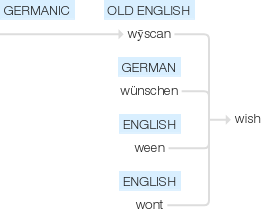Wish
Old English wȳscan, of Germanic origin; related to German wünschen, also to ween and wont.
wiktionary
From Middle English wisshen, wischen, wüschen, from Old English wȳsċan(“to wish”), from Proto-West Germanic *wunskijan, from Proto-Germanic *wunskijaną(“to wish”), from Proto-Indo-European *wenh₁-(“to wish, love”).
Cognate with Scots wis(“to wish”), Saterland Frisian wonskje(“to wish”), West Frisian winskje(“to wish”), Dutch wensen(“to wish”), German wünschen(“to wish”), Danish ønske(“to wish”), Icelandic æskja, óska(“to wish”), Latin Venus, veneror(“venerate, honour, love”).
etymonline
wish (v.)
Old English wyscan "to wish, cherish a desire," from Proto-Germanic *wunsk- (source also of Old Norse œskja, Danish ønske, Swedish önska, Middle Dutch wonscen, Dutch wensen, Old High German wunsken, German wunschen "to wish"), from PIE root *wen- (1) "to desire, strive for." Related: Wished; wishing. Wishing well as an enchanted water hole attested by 1819.
wish (n.)
early 14c., "act of wishing," also "what one wishes for," from wish (v.). Cognate with Old Norse osk, Middle Dutch wonsc, Dutch wens, Old High German wunsc, German Wunsch "a wish." Wish fulfillment (1901) translates German wunscherfüllung (Freud, "Die Traumdeutung," 1900).
